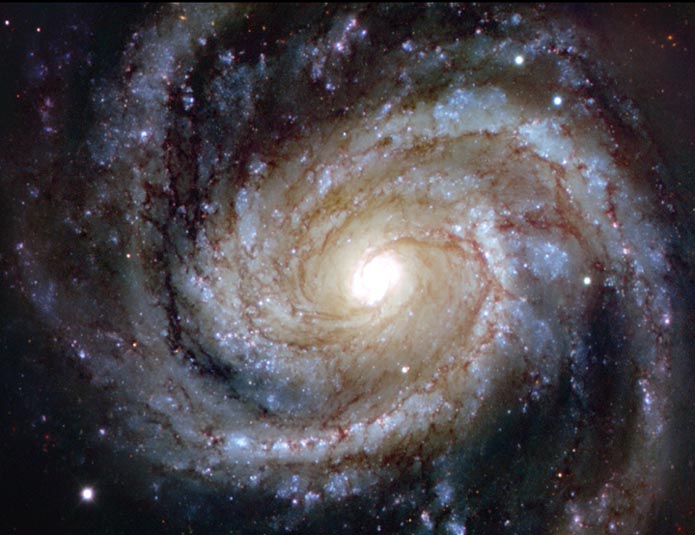
Spiral Galaxy
RA 12h 22m 54.92s Dec 15° 49' 20.11"
Coma Berenices
55 million light years
7.4' × 6.3'
160,000 light-years
10.1
5.26 x 3.94 arcminutes
North is 0.1° left of vertical
ESO
July 29, 2013
Full View:G0913 Closeup:G1330 Galactic Core:G1203 Infrared: G1042
ABOUT THIS IMAGE:
Spiral galaxies are usually very aesthetically appealing objects, and never more so than when they appear face-on. And this image is a particularly splendid example: it is the grand design spiral galaxy Messier 100, located in the southern part of the constellation of Coma Berenices, and lying about 55 million light-years from Earth. It was discovered by Pierre Méchain on March 15, 1781 and was subsequently entered in Messier's catalogue of nebulae and star clusters after Charles Messier made observations of his own on April 13, 1781.
While Messier 100 shows very well defined spiral arms, it also displays the faintest of bar-like structures in the center, which classifies this as type SAB. Although it is not easily spotted in the image, scientists have been able to confirm the bar's existence by observing it in other wavelengths.
This very detailed image shows the main features expected in a galaxy of this type: huge clouds of hydrogen gas, glowing in red patches when they re-emit the energy absorbed from newly born, massive stars; the uniform brightness of older, yellowish stars near the center; and black shreds of dust weaving through the arms of the galaxy.
Messier
100 is one of the brightest members of the Virgo Cluster, which is the
closest cluster of galaxies to our galaxy, the Milky Way, containing over
2000 galaxies, including spirals, ellipticals, and irregulars. This picture
is a combination of images from the FORS instrument on ESO's Very Large
Telescope at Paranal Observatory in Chile, taken with red (R), green (V)
and blue (B) filters.